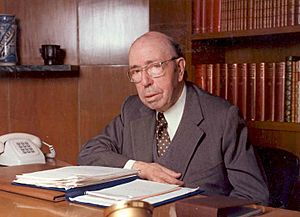Antoni Esteve Subirana facts for kids
Antoni Esteve i Subirana (born in Manresa in 1902, died in Barcelona in 1979) was a Catalan pharmacist. He was the first person in Spain to create important medicines like vitamins and sulfonamides. Like his father, Antoni was very involved in his country's culture and society, but he never wanted to work in public office.
He led many science groups in Catalonia and the Balearic Islands. He was also part of the science team at the Institute of Catalan Studies. Antoni wrote over 60 articles and books. These writings were known for being very detailed and well-researched.
Contents
A Pharmacist's Journey
Antoni Esteve i Subirana came from a long line of pharmacists. His family's pharmacy journey began in 1787 with Tomàs Esteve i Gabanyach in Manresa. Today, the seventh generation of the Esteve family still works at this same pharmacy.
Antoni Esteve finished his pharmacy degree with honors from the University of Barcelona in 1924. The next year, he started studying for his doctorate in Madrid. He planned to write his main research paper in Barcelona. However, his father passed away unexpectedly in 1927. This meant Antoni had to focus on the family pharmacy in Manresa first. He wrote in his memories that he needed to keep the pharmacy running and support his mother. His main goal was to keep the good reputation his father had built for the pharmacy.
A small lab was set up above the pharmacy a few years earlier. Soon, this lab was used to create new medicines. The first new medicine was vitamin D, which was sold under the name Esterosol. Making new medicines became a big part of his work. So, in 1931, Antoni Esteve started what would become a very important Catalan medicine company: Esteve Laboratories.
Time Away from Home
During the Spanish Civil War, Antoni Esteve kept working at the pharmacy in Manresa. His lab was very important for making sulfonamides. These medicines treated infections, and it became hard to get them from Germany. Antoni said that his team always made enough, even when it was difficult to get the materials.
When Catalonia was taken over by Francisco Franco's army, Antoni Esteve went to France. There, he worked with famous people in the medicine industry and in a well-known lab. Soon after, World War II started. German troops moved across France, forcing him to return to Barcelona. When he came back, he faced legal issues for political reasons and had to pay a fine. He was not allowed to take part in political or cultural activities. Because of this, Antoni Esteve put all his energy into his science work. He wrote that while he was in France, his family was often bothered and faced problems from the new authorities in Manresa.
The Barcelona Lab
After Antoni returned from France, the lab moved to Barcelona. This started a new chapter for the company. It grew bigger and began to sell many new medicines. In 1944, his lab was the first in Spain to make penicillin. Alexander Fleming, who won the Nobel Prize for discovering penicillin, even visited Esteve Laboratories in 1948. In 1952, the company started making a new medicine to stop bleeding. This helped the company grow internationally, which was a big achievement for a Catalan company during those early years.
All these successes came from the great research in chemistry and medicine led by Dr. Antoni Esteve himself. He built a team of excellent scientists, including Antoni Oriol i Anguera, Josep Laporte i Salas, F. Regné de Otal, and his own son Josep Esteve i Soler.
In 1965, Antoni Esteve believed that "new, young blood" was needed to keep up with the fast changes in the world. So, he stepped aside and made his son, Josep Esteve, the general manager.
Antoni Esteve passed away in Barcelona in 1979. This was the 50th anniversary of Esteve Laboratories. Four years later, his family created the Dr. Antoni Esteve Foundation to honor his memory. This Foundation's main goal is to help improve medicine through scientific talks and sharing ideas.
Awards and Recognition
In 1934, Antoni Esteve won the gold medal at the VIII Congress of Catalan Physicians and Biologists.
He was a member of the Scientific Section of the Institute of Catalan Studies for over 25 years and even served as its president. In 1955, he helped start Barcelona's Royal Academy of Pharmacy and was on its board for almost ten years. In 1959, he founded the Latin Mediterranean Pharmaceutical Society and was its vice-president. He also served as the vice-president of the Academy of Medical Sciences of Catalonia and the Balearic Islands.
Lasting Impact
Antoni Esteve was the first person in Spain to produce important medicines like organic arsenic compounds, sulfonamides, and penicillin. Besides these contributions to medicine, he also left a cultural legacy. This includes his more than 60 publications and his work in many projects to support Catalan culture and language.
See also
In Spanish: Antoni Esteve Subirana para niños


